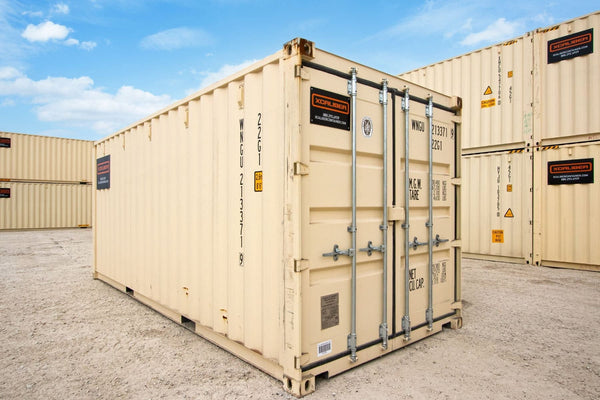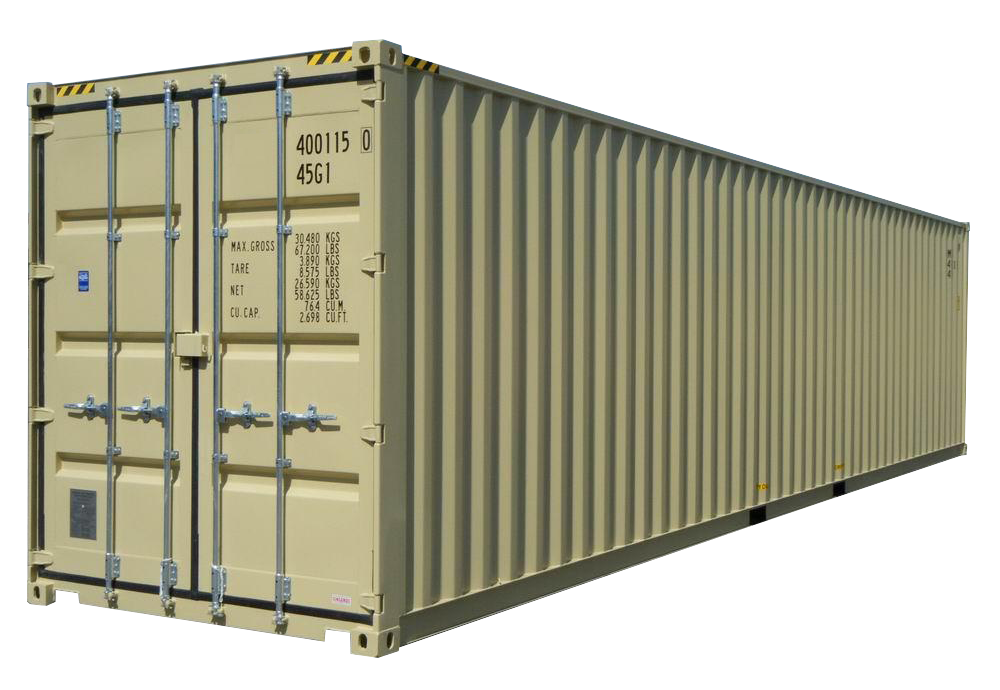How to Buy New Shipping Container 40 x 8 x 9.6 and Convert It into an Eco-Friendly Office
How to Buy New Shipping Container 40 x 8 x 9.6 and Convert It into an Eco-Friendly Office
Blog Article
The Ultimate Guide to Picking the Right Shipping Container for Your Needs
When it pertains to selecting the right shipping container, comprehending your specific requirements is essential. You'll want to consider aspects like dimension, type, and material to assure you make the most effective selection. From conventional dimensions to specialized options, there's a great deal to check out. Plus, budgeting for both the container and any modifications can make a huge distinction. Allow's break down the vital facets to help you discover the best fit for your needs.
Recognizing Delivery Container Sizes
When you're choosing a shipping container, recognizing the various sizes available is crucial for making the ideal choice. Shipping containers typically come in basic lengths of 20 and 40 feet, but you'll also find various other measurements. Recognizing the dimension you require relies on what you plan to shop or transport.If you're relocating smaller things, a 20-foot container could be perfect, while bigger shipments typically need a 40-foot container. The height can also vary; high dice containers provide added upright area, which can be helpful for taller goods.Before determining, gauge your freight, and think about exactly how much room you'll require for filling and unloading. Constantly factor in potential future requirements-- selecting a slightly larger container might save you headache down the line. Inevitably, choosing the best size will certainly improve performance and ensure your things are safe throughout transit
Types of Shipping Containers Available
There are numerous kinds of delivery containers readily available, each designed for particular purposes and cargo needs. The conventional dry container is flexible, best for basic freight. If you're delivering subject to spoiling goods, consider a refrigerated container, which preserves a regulated temperature. For large items, high dice containers supply additional height, suiting taller loads.If you need to deliver hefty machinery or tools, flat shelf containers give a tough base without walls. Open-top containers permit for easy loading of high cargo, with a removable tarpaulin covering for security. If you're trying to find flexibility, take into consideration a collapsible container that can be conveniently kept when not in use.Lastly, specialized containers like container containers are made use of for liquids, while vented containers are developed for bulk freight that requires ventilation. Understanding your freight kind will certainly help you choose the right container to fulfill your delivery requires successfully.
Product Considerations for Durability
When choosing a shipping container, the material plays a crucial function in its toughness. You'll wish to weigh the advantages of steel versus aluminum, specifically regarding corrosion resistance. Understanding these elements can help you make a more enlightened choice for your shipping requires.
Steel vs. Light weight aluminum Containers
Just how do you pick between steel and aluminum containers for your delivery requires? Beginning by taking into consideration sturdiness. Steel containers are robust and deal outstanding toughness, making them perfect for heavy lots and harsh problems. They stand up to damages from effects and are commonly less costly, which can be a major element for budget-conscious buyers.On the other hand, aluminum containers are light-weight, which can save you on shipping expenses. They're simpler to maneuver and are a fantastic choice if you require to transport items often. Light weight aluminum is generally much more expensive and much less robust than steel. Consider your details needs meticulously, consisting of weight, cost, and the kind of cargo you'll be delivery, to make the right selection for your circumstance.
Deterioration Resistance Aspects
Selecting the ideal material doesn't simply include weight and price; rust resistance plays a substantial function in durability. When picking a delivery container, consider the environment it'll deal with. Steel containers, while strong, can rust otherwise appropriately dealt with. Look for options with safety finishes or galvanization to improve their lifespan. Aluminum, on the various other hand, offers natural rust resistance, making it perfect for seaside locations or humid conditions. Nevertheless, it can be a lot more pricey. In addition, examine the container's use-- if it'll be revealed to chemicals or rough climate, prioritize materials that can stand up to these problems. Purchasing a corrosion-resistant container currently can conserve you from costly repair work or substitutes down the line. browse this site Pick wisely for long-term benefits.
Modifications and Customization Options
Delivering containers aren't simply for moving items; they can be transformed to fulfill your details requirements via different adjustments and customization alternatives. You can convert a standard container into a comfortable office, a short-lived retail store, and even an individual fitness center. The possibilities are virtually endless.Think regarding adding windows, insulation, or ventilation to boost comfort. You might additionally think about electrical circuitry, pipes, or perhaps custom shelving to boost functionality. If safety and security's a worry, strengthened locks can provide tranquility of mind.For aesthetic allure, you can repaint the container or add a special layout to make it stick out. Don't ignore floor covering choices-- whether you want durable plywood or something a lot more sophisticated, it can boost the space.Ultimately, tailoring your shipping container to match your requirements can improve use and produce an one-of-a-kind environment that mirrors your style.
Examining Your Transportation Demands
When it concerns using your modified delivery container, recognizing your transport needs is crucial. Beginning by identifying what you'll be delivery-- whether it's hefty equipment, retail products, or individual items. Each kind of freight has different needs concerning dimension, weight, and accessibility.Next, think about the distance and mode of transport. Are you delivering locally, country wide, or globally? This impacts the container's design and performance. If you're making use of vehicles, guarantee your container fits typical dimensions for easy loading and unloading.Additionally, think of transit problems. Will your items need special security from climate or temperature level changes? If so, you could require insulation or air flow features in your container.Lastly, assess how usually you'll be moving items. Constant shipments may require a more resilient and functional container to meet ongoing demands. By dealing with these aspects, you'll be well-prepared to choose the ideal shipping container for your requirements.
Budgeting for Your Shipping Container
Setting an allocate your shipping container helpful hints is important for guaranteeing a smooth acquiring process. Figure out exactly how much you can afford to spend. Remember that prices can vary substantially based upon dimension, condition, and type. New containers typically cost more, yet made use of ones can offer considerable savings.Next, take into consideration any kind of extra costs you might incur, such as transport costs, shipment charges, and modifications. If you plan to personalize the container, consider those costs as well. Research various vendors to contrast rates and discover the very best bargain that satisfies your needs.Don' t forget to consist of any type of licenses or policies that may relate to your purchase and usage of the container. By plainly describing your budget, you'll be much better prepared to make educated decisions, ensuring you get the right container without damaging the bank.
Upkeep and Look After Durability
To guarantee your delivery container lasts for years, routine maintenance is vital. Begin by inspecting the exterior for corrosion, dents, and damages. If you find any kind of issues, resolve them right away to stop more deterioration. Clean the container occasionally, both throughout, to eliminate dust, particles, and dampness that can cause corrosion.Ensure the doors seal correctly and lube the hinges to stay clear of rust and sticking. If you're utilizing the container for storage space, think about adding ventilation to reduce moisture and mold and mildew growth. For extra defense, use a rust-inhibiting paint or sealer annually.If your container's located in a harsh setting, like coastal areas, you could require to boost maintenance regularity. Watch on the flooring, also; any signs of wear need to be fixed as soon as possible. With these basic steps, you'll extend the life of your shipping container substantially.
Often Asked Inquiries
How Do I Discover a Reputable Shipping Container Vendor?
To find a trusted shipping container provider, start by investigating on the internet evaluations, asking browse this site for recommendations from pals or market get in touches with, and comparing prices. Constantly check their credentials and guarantee they provide top quality containers that meet your requirements.

Can I Rental Fee a Delivery Container Rather Than Purchasing?
Yes, you can definitely lease a shipping container instead of buying one. Several providers use rental choices, which can save you money and give flexibility if you only need it for a short duration.
What Allows Are Required for Container Placement?

Are Shipping Containers Weatherproof and Appropriate for Outdoor Storage Space?
Yes, delivering containers are typically weatherproof, made to stand up to severe conditions. Their durable building and construction keeps your items safe and secure and dry, making them ideal for outside storage space. Simply guarantee proper air flow to protect against dampness build-up inside.
How Do I Transfer a Shipping Container Once Bought?

Report this page